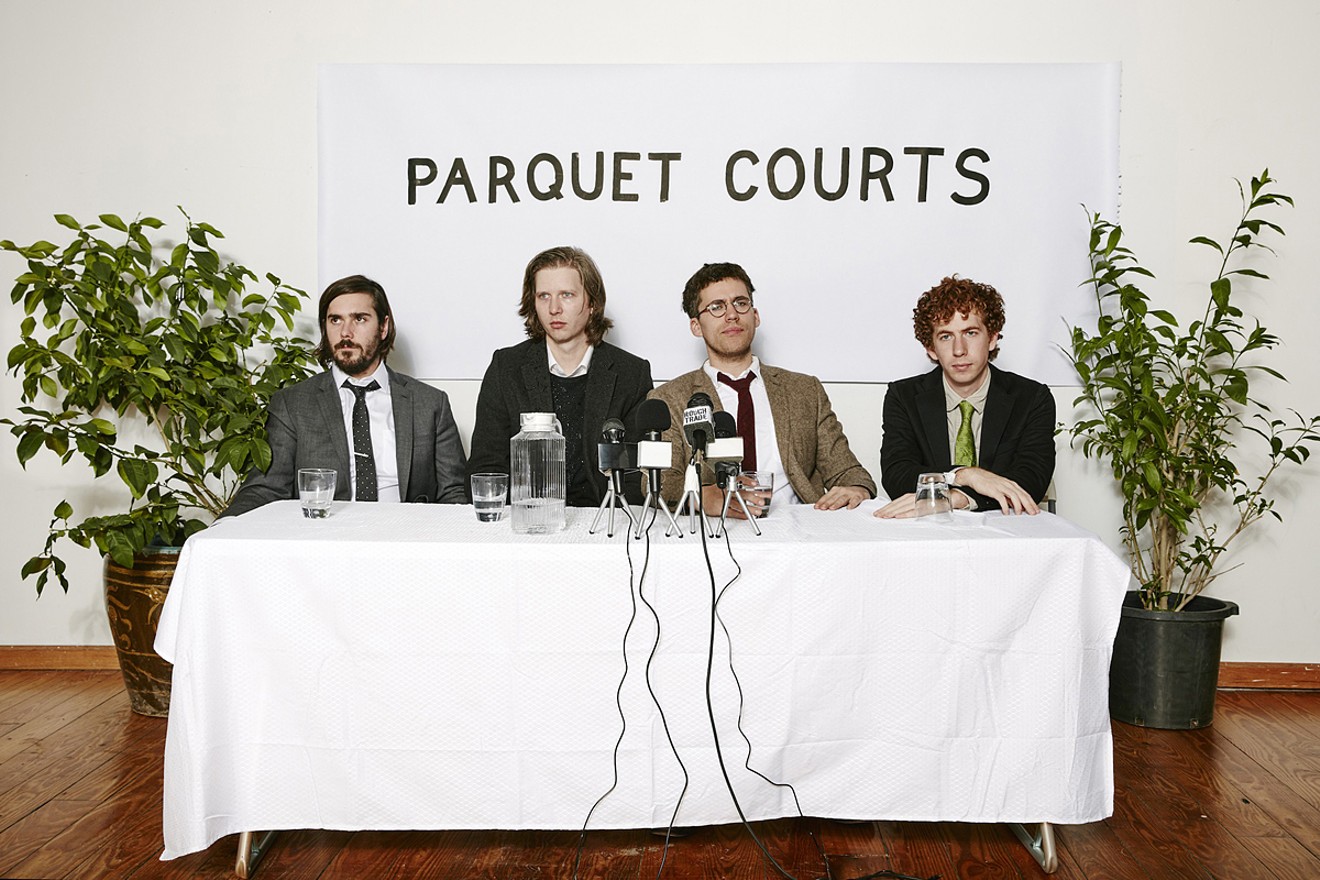In a 1973 interview with Dick Cavett, Marlon Brando claimed that all people were constantly performing, not just out of habit but out of necessity. "We couldn't survive a second if we weren't able to act," he said. "Acting is a survival mechanism; it's a social lubricant. We act to save our lives everyday."
Brando didn't like talking about acting. Parquet Courts' lead singer, Andrew Savage, is similarly hesitant — even resistant — to critically discuss his own work.
In a phone interview, Savage says all the insight he has to offer on his lyrics is already contained within the songs themselves. "I encourage anybody to dive in and try to figure them out," he says, "because even I'm still doing that."
But Savage's lyrics are gloriously obscure, succinct, and concrete, woven with self-effacing narratives and jigsaw-puzzle imagery that makes his intentions difficult to pin down.
"Paraphrased, can't be quoted, it's hard to say," he groans at the beginning of "Paraphrase," the fifth track on the band's most recent album, Human Performance. "Sometimes I drop definition from my words/Sometimes my speech recalls moments of violence/Sometimes I can't be repeated, I can't be paraphrased, no," he screams at the end.
Savage nonetheless seems happy to entertain questions and share his thoughts on the self and society, as long as you don't dwell too much on the band's latest album. "It's hard for me to go back to that place where I was writing that record," he explains. "It's difficult to go back and get in that head space."
"We all have a lot of different people living in us."
tweet this
Brando's claim that everyone always acts is captured in the title Human Performance. To be human is to perform, and that performance might manifest onstage, in bed, on the couch in front of the TV, or over the phone with a journalist. We are always acting with other people. But we aren't just one actor, according to Savage: We are a cast of characters suited to the situation.
"I really believe we are an ensemble of different voices and ideas," he says, "and those together make us who we are. Being in a band is an obvious performance itself in a very literal sense.
"My music and my art comes from a lot of different sides of me," he adds. "We all have a lot of different people living in us. For me, every one of them is represented in the song and artwork that I do — even the interviews that I do."
This isn't a new thought. In his 1885 poem "Song of Myself," Walt Whitman boasts, "I am large, I contain multitudes." But today's multitudes seem to have, well, multiplied since Whitman's time. It's unlikely the poet could've foreseen the innumerable identities that've sprung from our digital devices and social media accounts, each of which represents a varied and unique "me."
Savage, on the other hand, doesn't use social media. "Facebook pages/Boring boring!" he yelled on 2011's "American Specialties." Unlike many people who resign from social media, Savage's decision to disconnect is more of a personal preference than form of protest.
"I spend time on the internet," he says, "and I'm not coming from a point of judgment, but I don't use social media. I choose to live a lifestyle in which I don't have a phone tethered to me. I don't like having all that information at my fingertips."
Disconnection has its benefits. With social media come many identities, and with access to those accounts comes responsibility for upkeep. "Those identities require a certain amount of maintenance," Savage says, "and you see that some people are tidier shopkeepers than others, as far as the maintenance of their online personas."
But disconnection also has its downsides, like that time Savage was in Atlanta and his friend needed to download an app to pay for a parking spot. "She had an iPhone," he says, "but if I were in that situation, what would I have done?" Savage was speaking from his flip phone.
Savage can live with these inconveniences — he admits the parking example was "small peanuts" — but he's genuinely concerned about what constant connectedness might mean for society and the growing population of digital natives who are unfamiliar with analog. "I have friends with kids," he says. "It's crazy to see them swipe a magazine like it's an iPad. That bent my mind."
Meanwhile, Savage and his generation are in what he calls an "awkward transition" between analog and digital, a transition that is complicating relationships with others and themselves.
The sanctity of solitude is a running theme for Parquet Courts. It was best expressed through the band's 2015 album, Monastic Living, but was more recently explored in Human Performance's "Berlin Got Blurry," when Savage sings "Cell-phone service is not that expensive/But that takes commitment, and you just don't have it/It feels so effortless to be a stranger/But feeling foreign is such a lonely habit."
"If you are lonely when you're alone, you are in bad company," French philosopher Jean-Paul Sartre quipped. The quote could've just as easily come from Savage's mouth.
Parquet Courts
With Mary Lattimore. 9 p.m. Tuesday, February 7, at Gramps, 176 NW 24th St., Miami; 305-699-2669; gramps.com. Tickets cost $15 via ticketfly.com.











